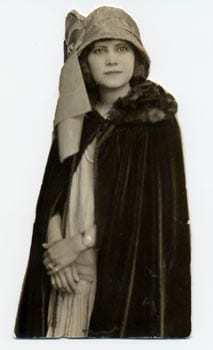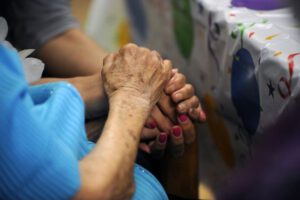
On her 105th birthday, Dominguita Velasco danced so long that her worried family asked her to sit down.
When she turned 111, she had a party with friends and family and blew out the blaze of candles on her cake.
Never far from her daughter, grandson and great grandchildren and always involved in her Oakland neighborhood, Dominguita says the secret to her long life has been to “stay happy.”
Her great granddaughter thinks it might be something else as well.
“I don’t know but I think it’s genetic,” said Erika LaTour. “Her mother lived to 102.”

A long-time customer of 23andMe, Erika recently signed up her great-grandmother for the service.
The two wanted to delve into the genetics of both Dominguita’s interesting ancestry – she’s from Mexico and has a mix of Native American, Southern European, Sephardic, and a little Ashkenazi Jewish ancestry – and the traits that may have contributed to her long and healthy life.
“She’s really just had some issues with high blood pressure but doesn’t really take any medication,” Erika said.
Although Dominguita has had some issues with her heart, her hearing, and glaucoma, she’s never felt burdened by them. Or, as she says, “I don’t have any pain.”
On Mother’s Day – May 12th—Dominguita will turn 112, making her the 28th oldest “validated living supercentenarian” in the world, according to Gerontology Research Group. 23andMe would like to wish her a happy birthday, and you can sign a card for her here or simply post your wishes on Twitter or 23andMe’s Facebook page.
Supercentarian
A “supercentenarian” is anyone who lives to be more than 110. Of the more than a quarter of a million people genotyped by 23andMe, about 100 are over the century mark, but none are as supercentenarian as Dominguita.
While average life expectancy continues to rise, the reasons why some people live long and healthy lives—even working into their 90s and beyond—and others don’t are still not known. There are some intriguing possibilities.
One genetic link to longevity that appears to be pretty strong is the APOE gene, better known for its association with Alzheimer’s disease. In particular, while people with Alzheimer’s are more likely to have a version of the APOE gene known as e4, long-lived individuals are less likely to have the e4 version. Similarly, the e2 version of the APOE gene is associated with a lower risk of Alzheimer’s and higher odds of being long-lived.
Researchers at Albert Einstein College of Medicine’s Institute for Aging Research are focused on Ashkenazi Jewish ancestry and a few genetic variants in two genes – CEPT and APOC3 – that protect against certain conditions. A different variant in APOC3 among Amish people is associated with lower levels of “bad” LDL cholesterol. Meanwhile, another study identified variants in the FOXO3a gene that may protect against certain cancers and heart disease in people of Japanese ancestry. National Geographic recently included a graphic illustrating the studies.

The Secret to a Long Life
However intriguing all of this is, no one has yet found the secret to a long life. Some of it is clearly genetic, but lifestyle and diet almost certainly play a significant role. On the Greek Island of Ikaria, a wonderful mix of diet, genes, and a relaxed and straightforward daily life seems to be particularly conducive to a long life.
And in Dominguita’s case, she may have benefited from all of those things. Her philosophy of staying happy, her genes, and her active life may all have helped her live a long life. A fixture in the local lore of Oakland, California, where she has lived since the early 1920s. Dominguita has by no means escaped hardship. She lost her husband and a daughter to tuberculosis and scraped and saved to raise her surviving daughter. She also had to work hard to keep her family restaurant afloat. But she did it all while remaining active in her community and surrounding herself with family.
Happy Birthday Dominguita, your life inspires us all.



